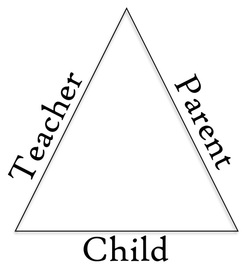 The idea of the Suzuki Triangle is of an equilateral one, with the parent, the teacher, and the student in each of the sides. This illustrates that all roles are equally important and mutually supportive. The Triangle can't sustain itself without cooperation and clear communication between its components. Why cooperation? The adults involved in this process have a common goal: the education of the student. The teacher and the parent want what is best for the student in front of them, and should work as a team to achieve such objective. And just like in a sports team, sometimes the opinion of one player is different from the opinion of the coach, which might be different also from the opinion of the fans... What to do, then? Communicate! Communication between the 3 sides of the Triangle should be based on honesty and respect. Clear and honest communication avoids misunderstanding and keeps all parties on the same page. Parents should not be afraid to ask questions, and teachers should not be afraid to listen and respond to them. Within the model of the Triangle, each side has responsibilities. Understanding what is expected from the parent, the child, and the teacher will help to keep the communication line open and to develop the child’s skills to the best of their abilities! Here is a short list of some of the responsibilities:
Besides the ideas above, I also suggest watching this short video: The Expanded Suzuki Triangle: Nurturing the Student within the Community. I have recently re-read this book and I though it could be a good way for me to start this blog again.
I would like to suggest "Punished by Rewards" by A. Kohn. A lot of interesting ideas on how to increase motivation towards short- and long-term goals without making the child dislike practicing. Have you ever wondered what they are actually learning? Veteran teacher Sue Hunt has compiled a list of 36 skills that are developed by the time we move on from the Twinkle Variations.
Notice that some of her word choices vary slightly from the ones I use in lessons, for example: she uses "Stop, prepare, play" while I use "Stop, think, move" or "Finger, bow, then go", but the message is the same... Here it is a link to her list. Hello!
After a long time away from this blog, I am back! And I would like to suggest this another blog post (whose title I borrowed to use in here). The original text is presented in the SharMusic Blog. Click here to go to that page. Enjoy! I hope you all had a good first week of lessons and a good class on Saturday!
Since practice is always a subject that creates a lot of questions, I will suggest a book that deals specifically with it: "Helping Parents Practice: Ideas for Making it Easier" by Edmund Sprunger. If you would like to learn more about the author, you can see a short bio here or visit his publisher's website. Hello! Here is a PDF of the article about the SAA program called "Parents as Partners Online", to which I was honored to present a video about my experiences working with children with disabilities. The article by Christie Felsing is from the American Suzuki Journal, Summer 2012.
Hello,
I would like to share a blog post from Laurie Niles, editor of the Violinist.com website. It's a very well written text about why we should not buy the cheap instruments online: http://www.violinist.com/blog/laurie/201011/11787/. Enjoy! On August 31st, 2012 I will be featured as a guest lecturer to the University of New Mexico's String Pedagogy Program, talking about "The Importance of Deep Practice: Doing it & Teaching it". The topic includes the importance of making mistakes and how motor skills are learned.
Dear all,
I hope you are enjoying browsing through my new website! I would like to suggest a book to read. It's well written and easy to understand... it also makes it clear the reason why it's so important to practice with correct posture and efficient motion patterns from the very beginning. The book is called "The Talent Code", by Daniel Coyle. Enjoy your reading! |
|||||||
 RSS Feed
RSS Feed